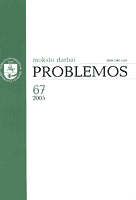AUGUSTINO LAIKO SAMPRATOS ONTOLOGINĖS IR TEOLOGINĖS YPATYBĖS
ONTOLOGICAL AND THEOLOGICAL ISSUES OF AUGUSTIN’S CONCEPT OF TIME
Author(s): Tomas KiaukaSubject(s): Philosophy
Published by: Vilniaus Universiteto Leidykla
Keywords: Augustin; time; eternity; theology; God
Summary/Abstract: The article deals with the philosophical and theological assumptions and consequences of Augustin’s concept of time in his Confessions book 11. Critical analysis of this text shows an essential issue of Augustin’s concept of time: the confrontation of time and eternity, which emerges from the influence of ontological assumptions of neoplatonist philosophy. It maintains that this dualism of time and eternity implicates a theological conflict between the Creator and creation and that this conflict diminishes temporal life for the sake of eternal life. The article also maintains that such interpretation of time by Augustin diminishes the main truth of Christian faith – the event of incarnation as the act of God’s love – if the function of time limits itself within the experience of an earthly being as a temporal and meaningless one.
Journal: Problemos
- Issue Year: 2006
- Issue No: 70
- Page Range: 126-133
- Page Count: 8
- Language: Lithuanian

